Tracking Them Down
I WAS in my early twenties in 1971, working as a junior journalist in the Features department of what was then the very busy Manchester office of The Guardian. I had family connections to the music halls and variety, and the affable Northern Features Editor, John Course, responded positively to the idea of my tracking down the last of the veterans still working.
My grandfather, Fred Elcock, who came from Dudley in the Midlands, had worked in the music halls with his partner Jack Dutton before the First World War not as an entertainer as such, but as an acrobat and gymnast – his speciality was leaping a billiard table lengthways. Because of these skills, he was popular in the halls as a front-cloth turn who performed his feats of strength and daring while the sets were being changed behind the curtain. Fred came to the notice of impresario Fred Karno, who used him whenever he was touring his shows in the Midlands, and that was how my granddad came to know two members of Karno’s regular troupe – Stan Laurel (then working under his real name, Stan Jefferson) and Charlie Chaplin. I loved to sit on Fred’s knee when I was little, listening to his tales of Stan, Charlie and other stars with whom he had appeared – Marie Lloyd, Dan Leno and George Robey – them at the top of the bill and him way down at the bottom, if mentioned at all.
Fred gave up show business after serving in World War l – he just lost the heart for it, said my Nan, after what he had seen in battle – and spent his working life as a clerk in the Michelin factory at Newcastle Under Lyme in the Potteries.
The Guardian thought my interviews with the old-timers would make a novel occasional series, and John Course suggested that my good friend Don McPhee, a staff photographer, go with me. Although Don was my age, he also had a great liking for variety entertainment and was a big fan of Max Wall.
In almost all other respects I was very much a boy of my times . . . flower power, Hendrix and the Stones, expertly rolling joints and taking LSD. With the introduction of the contraceptive pill, we enjoyed what other journalists – the middle-aged ones on the tabloids – enviously called “free love” in those long-ago days. The Permissive Society, it was known as.
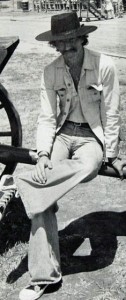
Stephen Dixon in 1971: why would old people be nervous of me?
We wore cheesecloth shirts, Afghan coats, big flares and shoulder-length hair. Some of us had droopy moustaches and Afros. But a little bit of me was different. My other friends were mostly tolerant of my interest in music hall, which they regarded as a baffling and deeply uncool eccentricity, though they did point out that they preferred listening to Hawkwind rather than George Formby while stoned.
The year-long journey Don and I took into the world of music hall, fading before us even as he brought it into focus and I switched on my tape recorder, took us to sterile little civic theatres and ornate Victorian variety palaces, a cluttered flat in Streatham and a modest semi in Eastbourne. There was a private music hall museum in Wimbledon and a beautiful bungalow in Steyning, Sussex. Brinsworth House, the retirement home for variety artists at Twickenham. Some of our old stars were grumpy and suspicious at first but warmed to us; others were delightful and welcoming from the start. One was defeated and drunk. We heard great stories and, much later and from other sources, the stories behind the stories: the sister act who allegedly shared a lover, the sexual difficulties of a revered clown, the composer of comic songs who had a sideline writing musical porn for private gatherings of fellow-pros, the retired tenor who turned out much later to have been the half-brother of a British Prime Minister.
But most of all, we heard about what it was like to work on the halls. Don was with me most of the time; when he wasn’t available I traveled alone, or with another Guardian photographer. It was a race against time, for by late 1972 two of the gang had gone, and the curtain was twitching for others. I stayed friendly with nearly all of them. We met from time to time and exchanged Christmas cards and letters. One or two sent me little presents. Why were they so very nice to me, these old stars? Part of it was the politeness and good manners common to their generation, and, more practically, I was a useful contact on a national newspaper. Also, I think my naivety and clumsy enthusiasm amused them, though they were mostly too kind to let it show. I was too inexperienced in life to appreciate the tremendous allure youth can have for the elderly. Their old bones were perhaps warmed by the attention of someone young enough to be a grandchild. Many of their contemporaries, the core fans from their own youth, probably needed help to get to the toilet by 1971.
And then, one by one, the members of my little gang of old stars took that last walk into the wings, and after a few years all were gone. The first of our ten was born in 1883 and the last died in 1990, so their collective story covers more than 100 years of British popular entertainment.
Now I am bringing them back: putting flesh on the ghosts of stars I knew half a lifetime ago, when I was so young and they were so old. The cardboard box full of spool-to-spool tapes, audio cassettes, notebooks, transcripts, yellowed cuttings and photographs has been living in various garages and attics for 40 years. I blow the dust off a spool and thread it through the antique tape-player I picked up in a car boot sale the other week. An elderly voice, formal and precise, quavers out. And there is another voice, one that makes me prickle with mortification: young and hesitant, asking questions that are often patronising and sometimes just plain daft.
These brittle spool and cassette tapes, most of them over 40 years old, are not of a good enough quality to transfer onto this site, though I hope to acquire the technology and expertise to clean them up and include excerpts at some point. I should also point out that I was not interviewing these people as a theatre historian or researcher, but as a journalist writing articles for a daily newspaper. If I had the same opportunity today, my questions would be quite different. Back then, I was simply seeking to provide an entertaining read over breakfast or on the train.
Don McPhee, The Guardian’s best-loved Northern photographer and a lifelong close friend, whose wonderful portraits you can see on this site, died in 2007. As well as the variety stars, together we had interviewed dozens of show business personalities, from Les Dawson to Vincent Price. To quote Les,* I do miss him.
*“And to make matters even worse, the wife’s run off with the bloke next door.” Long pause. “I do miss him.”
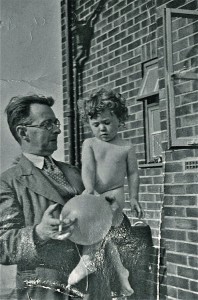
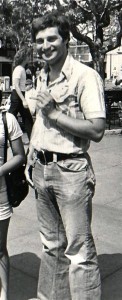
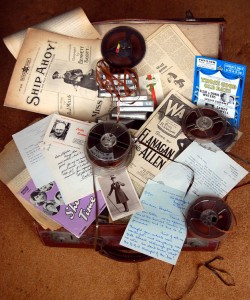
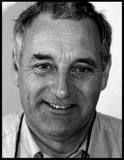
stephendee
| #
Doesn’t ring a bell with me, Stefan, tho it’s a very typical Sarony line. Anyone? Stephen
stefan Beard
| #
Just been reading the Leslie Sarony piece. Absolutely fantastic. Well done. A question if you don’t mind. Does anyone know the the title of the Leslie Sarony song that has the line “Oi ! how you gettin’ on? ” in it ?
ruskimic
| #
I do hope you can help me. I have been searching for many years for my Great Uncle Mr Albert Edward Rayner who went under the name of Dan Rayner. I believe he worked the Music Halls but I do know for sure he worked with Fred Karno. When Charlie Chaplin left Fred in America over a Pay dispute the American backers of the tour insisted that my Great Uncle Dan Rayner be called over from England to take Charlie Chaplin’s Place. It appears Dan was liked more at that time in America than Charlie was. Another man in the troupe at that time was Stan Laurel. When the show folded Dan was asked along with Stan to stay in America. As we know Stan stayed and found he fame and fortune. Dan however chose to return to England. He was last that I can find in a play Dick Wittington at the Empire Theatre advertised in the a local paper in Durham in 1948. Unfortunately I have not been able to find when or where he died. I am hoping that maybe on your search you came across some info on Dan Rayner. I live in Australia so am unable to search all the death records for England with out it costing me a fortune. So any help you maybe able to give me would be really appreciated. I know he went to America twice and once to Australia and also once to South Africa. I do know he was married to a lady named Barbara Robinson and they had a son Conrad Paul Rayner but I have been unable to find any thing out about these two members of his family. I do know they separated before 1935 and he lived with another lady named Phyliss but as to her last name I have no idea. I have been searching for nearly 10 yrs now and I don’t think there is any thing left on the net that can help me. You it would appear maybe my last chance. I will keep my fingers crossed that you did come across some info on him or you know some one that maybe able to help. He went to America in 1913 on the Lusitania and it shows at this time he is married. He then returns to America in 1914 on the ship Adriatic. I do believe he also did a radio show after 1935 for quite some time but do not know the name of that show. I do hope you can help in my search for my Great Uncle.
I also might add my great grandfather was Edwin Richard Barwick. He was also a Music Hall performer and appeared in the first Royal Command Performance. If you get the picture and Index to that even you will see him standing next to Pavlova. I would love to hear any information you may have found out about him. I do believe he was one of the first members of the charity named water rats, I know star was spelt back wards to get the rats part. Edwin did a lot of work for this charity in his day. What I would love to know is if there is any recording of Edwin Performing and if so how I would go about getting a copy or seeing any recording. I do have a photo copy of an old theatre bill with my grandfathers name boldly written on it. Again any help would be appreciated.
All the best and I look forward to hearing back from you in the near future
Kim Rayner
my email address is ruskimic@yahoo.com.au